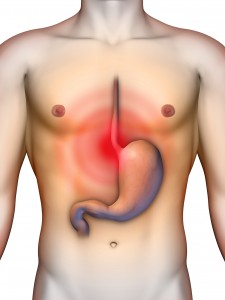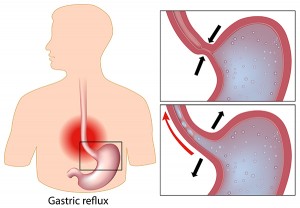Heartburn and indigestion
Heartburns affects many people and it consists mainly on a burning sensation that takes place when acid that is normally placed in the stomach moves back towards the tube through which food and drinks pass from the mouth to the stomach. The cardia at the upper portion of the stomach is usually closed during digestion. However, this sphincter sometimes does not firmly close; therefore, it allows the gastric acids to move upwards into the esophagus. This is known as gastro-oesophageal reflux. As the esophagus is not as well protected as the stomach, its epithelium can be inflamed by acid, causing digestive discomfort that can last from some minutes to many hours.
ETIOLOGY OF HEARTBURN AND ITS SYMPTOMS
Heartburn and indigestion might have similar origins and approximately one third of the healthy population suffer from dyspepsia and/or gastro-oesophageal reflux one a month. The most common symptom of this reflux is a burning sensation in the stomach and the esophagus. However, a person suffering from heartburn might also have regurgitation, it is, bringing food that has been swallowed back up to the mouth, what will leave a sour and bitter mouth sensation. Dysphagia might be another symptom. It is difficulty in swallowing and may cause pain when doing it. Heartburn is not a condition in and of itself, yet it may cause serious complications if it happens regularly.
Prevention
Prevention is one of the most important factors in order to avoid heartburn and indigestion. In this aim, good dietary habits and avoiding coffee, tobacco or alcohol is a must. You must not lie down when suffering a heartburn episode, as lying helps the acid reflux from the stomach. It is advisable to rest placing the head higher than the trunk of the body in order to allow the gastric juices to go down into the stomach. May your gastro-oesophageal reflux happen frequently, you should visit a doctor to identify what is causing it, as the symptoms of this reflux may conceal more serious conditions, such as an ulcer.
Food and drinks
Your stomach may produce excessive amounts of acid if you do not avoid “large meals”.
A pressure rise, with the subsequent acid release, may be the result of having overfilled the stomach.
- Not following an eating timetable or eating too fast may cause the stomach not to be able to release acid in the needed amounts for each meal.
- Eating before going to bed may facilitate acid release into the esophagus.
- Caffeine-containing and alcoholic beverages usually raise acidity amounts.
- Hot beverages and citrus juices do also cause these problems.
Be careful with what you eat
-
- Fatty foods usually spend more time inside
the stomach as fats need a slower digestion.
- Fatty foods usually spend more time inside
-
- Chocolate and mint may cause a relaxing effect on the cardiac sphincter,
what allows an easier acid reflux.
- Chocolate and mint may cause a relaxing effect on the cardiac sphincter,
-
- Spicy foods and food containing tomatoes or onions may also cause these problems.
Some other causes
of heartburn may be:
- Stress
- There are some medicines, the ones known as nonsteroidal anti-inflammatory drugs (NSAIDs) or some others that focus on heart, asthma and hypertension, that can cause a higher acid secretion in the stomach.
- Overweight is a condition that can also lead to digestive problems.
- Tight clothing may cause pressure on stomach.
Both hyperacidity and indigestion are common conditions during pregnancy and they usually worsen as it moves forward and most of the pregnant women show these problems during gestation.



